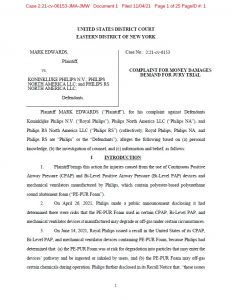Our law firm was handling Philips CPAP machine lawsuits for injuries from the recalled Philips CPAP machine.
The Philips recall covered an estimated 3.5 million sleep apnea devices. A CPAP class action lawsuit with thousands of plaintiffs has been consolidated into a multi-district litigation (MDL-1230). So, every Philips CPAP lawsuit in federal court—filed in New York, California, Texas, or wherever—was consolidated in federal court in Pennsylvania.
After the settlement, we are no longer reviewing new cases.
 Lawsuit Information Center
Lawsuit Information Center


